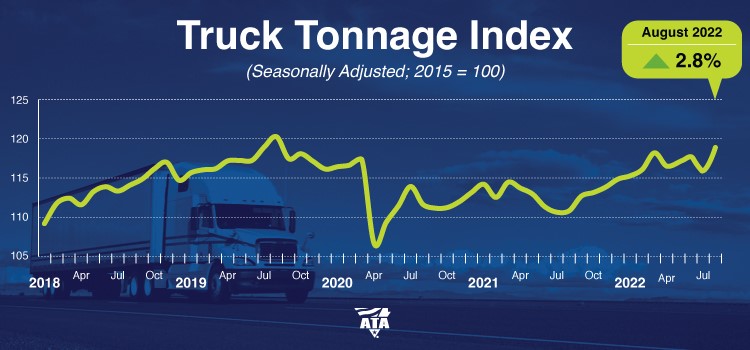Washington — American Trucking Associations’ advanced seasonally adjusted (SA) For-Hire Truck Tonnage Index rose 2.8% in August after decreasing 1.5% in July. In August, the index equaled 119 (2015=100) versus 115.8 in July.

“Tonnage snapped back in August after a weaker than expected July,” said ATA Chief Economist Bob Costello. “With the economy in transition to slower growth and changing consumer patterns, we may see more volatility in the months ahead. But the good news is that we continue to witness areas of freight growth in consumer spending and manufacturing, which is helping to offset the weakness in new home construction.”
July’s decrease was revised down from our August 23 press release.
Compared with August 2021, the SA index increased 7.4%, which was the twelfth straight year-over-year gain and the largest increase since June 2018. In July, the index was up 4.7% from a year earlier. Year-to-date through August, compared with the same period in 2021, tonnage was up 3.9%.
The not seasonally adjusted index, which represents the change in tonnage actually hauled by fleets before any seasonal adjustment, equaled 124.6 in August, 8.2% above the July level (115.1). In calculating the index, 100 represents 2015. ATA’s For-Hire Truck Tonnage Index is dominated by contract freight as opposed to spot market freight.
Trucking serves as a barometer of the U.S. economy, representing 72.5% of tonnage carried by all modes of domestic freight transportation, including manufactured and retail goods. Trucks hauled 10.23 billion tons of freight in 2020. Motor carriers collected $732.3 billion, or 80.4% of total revenue earned by all transport modes.
ATA calculates the tonnage index based on surveys from its membership and has been doing so since the 1970s. This is a preliminary figure and subject to change in the final report issued around the 5th day of each month. The report includes month-to-month and year-over-year results, relevant economic comparisons, and key financial indicators.